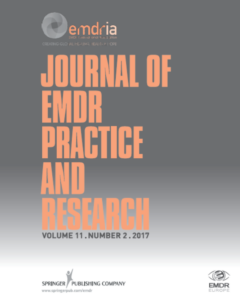The effectiveness of eye movement desensitization for post-traumatic stress disorder in Indonesia: A randomized controlled trial (Frontiers in Psychology)
EMD saw reductions in PTSD, anxiety and depression, and improvements in quality of life, though eye movements did not add to the efficacy.
Read MoreTrauma-focused treatments for refugee children: Study protocol for a randomized controlled trial of the effectiveness of KIDNET versus EMDR therapy versus a waitlist control group (KIEM) (Trials)
Effectiveness of EMDR vs. child version of Narrative Exposure Therapy (KIDNET) vs. waitlist, offered to refugee children.
Read MoreIntensive outpatient treatment for post-traumatic stress disorder: A thematic analysis of patient experience (European Journal of Psychotraumatology)
An exploration of patient experiences with an intensive, outpatient treatment for PTSD and a look at important factors behind treatment feasibility.
Read MoreADHD symptoms persist even when PTSD symptoms progress: An EMDR case report (Dusunen Adam The Journal of Psychiatry and Neurological Sciences)
EMDR can be used as an effective psychotherapy in children with ADHD and PTSD, for PTSD and oppositional defiant disorder (ODD), not ADHD.
Read MoreEfficacy of the eye movement desensitization and reprocessing group protocol with children in reducing posttraumatic stress disorder in refugee children (European Journal of Trauma & Dissociation)
A group treatment protocol developed especially for children was tested by a randomized controlled trial study with Syrian refugee children.
Read MoreImplementing an eye movement and desensitization reprocessing treatment-program for women with posttraumatic stress disorder after childbirth (Frontiers in Psychology: Psychology for Clinical Settings)
The purpose of this study is to describe the implementation and outcomes of an EMDR treatment-program for women with PTSD after childbirth.
Read MoreEMDR Therapy with people who have intellectual disabilities: Process: Adaptations and outcomes (Advances in Mental Health and Intellectual Disabilities)
Adaptations of EMDR therapy for people with intellectual disabilities in treating post-traumatic stress disorder (PTSD).
Read MorePositive internal experiences in PTSD interventions: A critical review (Trauma, Violence, & Abuse)
This study reviewed PTSD interventions to determine whether positive emotions were explicitly addressed and the goals of focusing on these positive internal experiences.
Read MoreTreating combat-related posttraumatic stress disorder using therapeutic fly-fishing with EMDR (TF-EMDR) (Journal of Military and Veterans’ Health)
A study on therapeutic fly-fishing and other nature-based methods integrated with EMDR therapy for treating combat-related PTSD.
Read More


